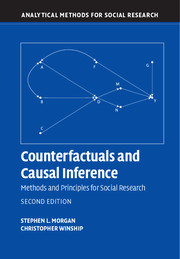Book contents
- Frontmatter
- Dedication
- Contents
- List of Figures
- List of Tables
- Acknowledgments for First Edition
- Acknowledgments for Second Edition
- I Causality and Empirical Research in the Social Sciences
- II Counterfactuals, Potential Outcomes, and Causal Graphs
- III Estimating Causal Effects by Conditioning on Observed Variables to Block Back-Door Paths
- IV Estimating Causal Effects When Back-Door Conditioning Is Ineffective
- V Estimation When Causal Effects Are Not Point-Identified by Observables
- VI Conclusions
- 13 Counterfactuals and the Future of Empirical Research in Observational Social Science
- References
- Index
13 - Counterfactuals and the Future of Empirical Research in Observational Social Science
Published online by Cambridge University Press: 05 December 2014
- Frontmatter
- Dedication
- Contents
- List of Figures
- List of Tables
- Acknowledgments for First Edition
- Acknowledgments for Second Edition
- I Causality and Empirical Research in the Social Sciences
- II Counterfactuals, Potential Outcomes, and Causal Graphs
- III Estimating Causal Effects by Conditioning on Observed Variables to Block Back-Door Paths
- IV Estimating Causal Effects When Back-Door Conditioning Is Ineffective
- V Estimation When Causal Effects Are Not Point-Identified by Observables
- VI Conclusions
- 13 Counterfactuals and the Future of Empirical Research in Observational Social Science
- References
- Index
Summary
What role should the counterfactual approach to observational data analysis play in causal analysis in the social sciences? Some scholars see its elaboration as a justification for experimental methodology as an alternative to observational data analysis. We agree that by laying bare the challenges that confront causal analysis with observational data, the counterfactual approach does indirectly support experimentation as an alternative to observation. But, because experiments are often (perhaps usually) infeasible for most of the causal questions that practicing social scientists appear to want to answer, this implication, when considered apart from others, is understandably distressing.
We see the observational data analysis methods associated with the potential outcome model, motivated using directed graphs, as useful tools that can help to improve the investigation of causal relationships within the social sciences, especially when experiments are infeasible. Accordingly, we believe that the methods associated with the counterfactual approach complement and extend older approaches to causal analysis with observational data by shaping the goals of an analysis, requiring explicit consideration of individual-level heterogeneity of causal effects, encouraging a wider consideration of available identification strategies, and clarifying standards for credible interpretations.
In this chapter, we first shore up our presentation of the counterfactual approach by considering several critical perspectives on its utility. We weigh in with the arguments that we find most compelling, and it will not be surprising to the reader that we find these objections less serious than do those who have formulated them.
- Type
- Chapter
- Information
- Counterfactuals and Causal InferenceMethods and Principles for Social Research, pp. 437 - 450Publisher: Cambridge University PressPrint publication year: 2014



